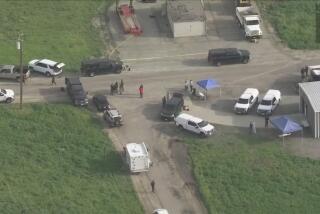Rescue Team Returns From Grim Task
- Share via
PACOIMA — For nine mind-numbing days, Scott Smith crawled through the rubble of the Alfred P. Murrah Federal Building in Oklahoma City with a machine-like determination to find survivors.
He shredded his leather gloves and jumpsuit in his relentless digging, deliberately ignored the scope of the carnage before him, and strained for the sounds of a living child. None came.
Only when he stepped off a bus in Pacoima Saturday and saw his wife and two young children--both wearing pint-size firefighters’ outfits--did the Castaic firefighter allow himself to cry.
“Usually when we go to stuff, it was an accident,” he said. “But as much as I try, I can’t make sense of this one.”
Smith and more than 60 members of the Los Angeles County Urban Search and Rescue Task Force came home Saturday, wearied from their task and humbled by its futility.
The elite team, trained to save lives by extracting victims from collapsed and damaged structures, found only bodies--many of them children--as they searched through the concrete remnants of the bombed-out office building.
Among the first to offer aid to the overwhelmed Oklahoma City Fire Department, the Los Angeles group arrived the day after the April 19 blast with 62 men and women, six dogs and two physicians to help them weather the daunting task.
This team, one of 10 such groups called to Oklahoma, was especially valued because of its earthquake experience: These were the people who helped in rescue efforts at the Northridge Meadows Apartments, where 16 people were killed in the 1994 quake.
Wearing dress uniforms and multicolored ribbon solidarity pins, they flew into March Air Force Base in Riverside County on Saturday afternoon to a formal, military-style welcome marked by officials’ speeches and piped-in marches.
But it was at their home base in Pacoima, at a run-down fire station, where the team received its real welcome. About 150 relatives and friends greeted the men and women with homemade banners, wild cheers and long, tearful hugs.
Many team members said they were consumed by their mission at the demolished federal building, working 12-hour shifts at the heavily guarded site, mindful of potentially lethal, shifting debris but compelled to go on by those anxiously waiting.
Meals, phone calls home, showers and briefings took up much of the rest of their time, and few got more than four or five hours sleep a night.
Some wore their steel-toed boots down to the steel from kneeling so much.
Oklahoma firefighters, many of whom knew victims of the blast, tried to help relieve them of the worst part of the job, they said, often removing the dead victims that the Los Angeles squad located.
Exhausted, they were finally relieved of duty if not the lingering feeling that the job wasn’t done.
“It’s hard to leave Oklahoma,” Smith said, with obvious regret, “but it’s easy to come home.”
Times staff writer Abigail Goldman contributed to this report.
More to Read
Sign up for Essential California
The most important California stories and recommendations in your inbox every morning.
You may occasionally receive promotional content from the Los Angeles Times.










